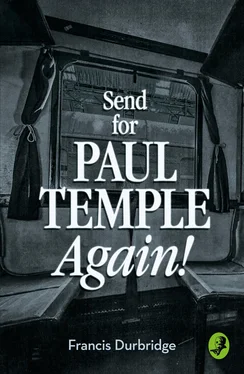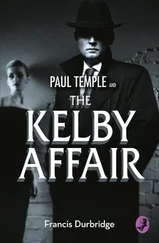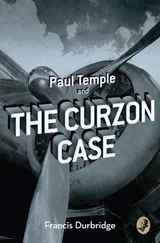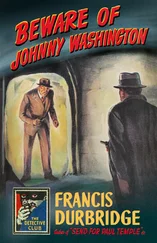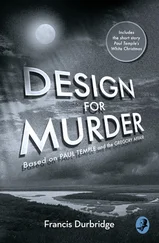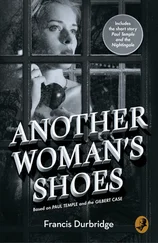‘What is it? What is it, man?’ he demanded. ‘Have you seen a ghost or something?’
‘Would you mind coming into the next compartment, sir?’ asked Webb in a very agitated tone. ‘It’s – it’s a young lady, sir. I think she’s been taken ill.’
The young man sat up with a start and at once rose to his feet.
‘Why, yes, of course,’ he murmured, following the ticket inspector into the next compartment. They found the young woman had now slid to the floor, where she was lying in an ungainly heap.
‘Take her shoulders,’ ordered the young man, catching hold of the woman’s feet. Rather awkwardly, they lifted her on to the seat and laid her full length. The Welshman placed a finger and thumb beneath her eyes, then felt her pulse.
‘What is it? What’s the matter with her?’ demanded Webb in an anxious tone.
‘What’s the matter with her! Why, lordy, man, she’s dead!’
The inspector’s jaw dropped. He bent forward and eyed the body intently, as if he could not believe what he heard. For some seconds there was no sound but the mournful scream of the engine’s whistle and the unceasing clatter of the wheels.
‘Shouldn’t we pull the communication-cord?’ suggested the Welshman, an excited flush mounting in his cheeks.
‘Don’t see that can help much,’ replied the other gruffly.
‘But, man, we should get a doctor…’
‘I’ll see if there’s one on the train first. No sense in losing time if we can help it. We’re running seven minutes late as it is.’
A sudden draught swept through the compartment. The window in the corridor was open again. The breeze stirred the curtains, which were closely drawn. Something caught the Welshman’s eye, and he drew back one of the curtains. He leaned forward and gazed intently at the corner of the window near where the dead woman had been sitting.
‘What are you staring at?’ demanded Webb.
For a moment the other did not reply. Then he suddenly gave to an exclamation.
‘Look what’s chalked on the window,’ he said, moving out of the light, so that the inspector could see for himself.
Rather laboriously, he spelt out the three letters that were scrawled in vivid red capitals. ‘R-E-X.’
‘Rex?’ repeated the little Welshman, with a puzzled frown. ‘Now what does that mean, I wonder?’
Arthur Montague Webb slowly shook his head. He was very puzzled.
It did not take the police long to discover that the dead woman was Norma Rice, the well-known actress, and within a few hours a dozen newspaper reporters were busily ferreting for facts to add to the rather scanty information about the lady in question which they found in their libraries.
Norma Rice’s career had always been something of a mystery, true, she made no secret of her origins. She was the daughter of a wardrobe mistress from the Theatre Royal, Drury Lane, and had spent her childhood in Peabody’s Buildings, within a stone’s throw of that famous theatre. Her gamin qualities and their potentialities had soon come to the notice of a certain Madame Terrani, who ran the famous Starlit Juveniles, and it was not long before Norma Rice was the ‘stooge’ of the outfit – the girl who always does the wrong thing and is a couple of beats behind the rest of the talented troupe.
Norma stuck it until she was fifteen, then she mysteriously vanished, to reappear four years later as the star overnight of a new Broadway musical, Glamour Incorporated , in which she sang and danced with such gay abandon that even the dour H. L. Mencken professed himself enchanted.
Norma remained in the show for six months, then staged another of her strange disappearances, re-emerging two years later as the lead in a sophisticated Hollywood film, Never Marry Strangers . Once again, the critics acclaimed her as a new star, but when the film company endeavoured to foreclose their option upon her services, she vanished again without leaving the slightest clue.
Back in England, she invested most of the money she had earned in founding a repertory company which appeared at a tiny theatre in a small town in Dorset. Later she scored a considerable success as Lady Teazle in a revival of The School for Scandal at the Viceroy Theatre in London, and was afterwards seen in several other costume parts. She had, in fact, only deviated from costume comedy on one occasion, to play the lead in The Lady Has a Past , by an unknown young dramatist named Carl Lathom, whose first play it was. It had proved a sensation in theatrical circles, yet once again Norma Rice had disappointed her public by withdrawing from the cast after six months, after which the play slowly fizzled out, despite the fact that the most expensive young actress in the West End had taken Norma Rice’s place.
It was not surprising that the more sensational newspapers found Norma Rice’s career more than a trifle intriguing, and engaged certain practised freelance journalists to ‘play it up’. You can’t libel a dead woman, so let’s have a double-page spread with plenty of pictures!
But none of the articles provided the solution as to how Norma Rice could have taken a large dose of Amashyer, a little-known drug with a delayed action, which had caused her death. Nor could they offer any clue to the identity of the melodramatic individual who had scrawled ‘Rex’ on the carriage window.
True, the police had discovered that a clever young actor named Rex Wilmslow had played opposite Norma on her last appearance in the West End, but as he had performed in a matinee and evening show in London on the day that she had died, it was difficult to prove that he could possibly have had anything to do with the tragedy.
A murder of a well-known person like Norma Rice presented many difficulties – always presuming she had been murdered – for a woman in her position was likely to have made enemies in almost any sphere of life, and such enemies might just as easily be in America as over here. It was a by-word, for instance, that she had alienated at least half a dozen big executives in the stage and film world by her impetuous actions, which had cost them thousands of pounds, and by her vitriolic tongue, which she never made the least attempt to restrain. As long as stage people could remember her, there had been rumours about Norma Rice. She was said to have slapped three dramatic critics’ faces, one after the other, during a first-night party; she was said to have extorted thousands of pounds from the Earl of Dorrington, whose son had been infatuated with her during his Varsity days; she was reputed to have obtained the famous Calcutta Pendant by a trick; she was said to spend months under the influence of opium, hence her mysterious disappearances…
Few people had liked Norma Rice, but her bitterest enemies had to admit that she possessed that certain something which held an audience from the first moment she set foot on the stage.
Naturally, all these sidelights on Norma Rice’s character ended to confuse the issue, and the Special Branch Commissioner of New Scotland Yard was more than a little worried when he attended the third conference in the office of Lord Flexdale, Secretary for Home Security. It was by no means the last conference. The Norma Rice murder was followed by two more within a comparatively short space of time.
Newspapers made Rex the subject of leading articles which cast no uncertain aspersions at the efficiency of the police force.
The name Rex could be overheard in conversation upon almost any public vehicle as passengers opened their morning and evening papers, and the Sunday Press indulged in a shoal of speculative articles, signed by so-called experts. When the total of Rex murders was up to four, Lord Flexdale decided it was high time drastic action was taken, and bluntly intimated as much to Sir Graham Forbes.
Читать дальше
